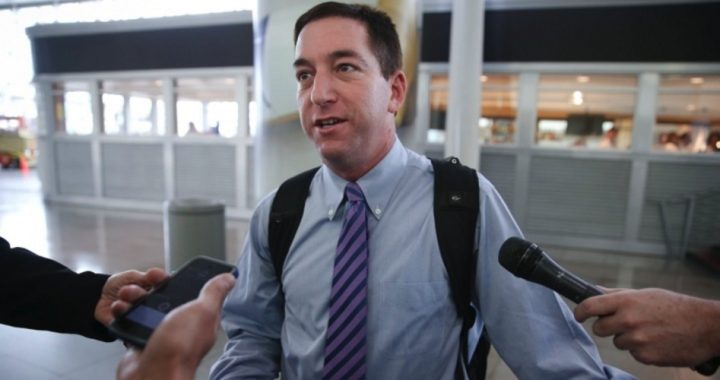
Ever wonder if any of your communications have been caught in the global surveillance net of the National Security Agency (NSA)? You might not have to wonder much longer.
According to the journalist who assisted former NSA subcontractor (and CIA spy?) Edward Snowden in disclosing documents proving the massive unconstitutional searching and seizing of electronic communications, he may soon reveal the names of American citizens who were targeted by the NSA.
In an interview published May 18 in the (London) Sunday Times, Glenn Greenwald (shown) hinted that Snowden’s legacy would be “shaped in large part” by a forthcoming “finishing piece.”
Speaking to GQ magazine, Greenwald dramatically described the possible scope of the disclosure.
“As with a fireworks show, you want to save your best for last. The last one is the one where the sky is all covered in spectacular multicoloured hues,” Greenwald said.
Putting a finer point on the issue, however, Greenwald told the Sunday Times:
One of the big questions when it comes to domestic spying is, “Who have been the NSA’s specific targets?” Are they political critics and dissidents and activists? Are they genuinely people we’d regard as terrorists? What are the metrics and calculations that go into choosing those targets and what is done with the surveillance that is conducted? Those are the kinds of questions that I want to still answer.
It’s likely that this master list, if it is ever published, will be very lengthy, in light of the various surveillance tactics the NSA has been using for years.
With the assistance of Greenwald, Snowden has leaked one constitutional violation after another committed by the NSA. All of which, it must be understood, was done with the cooperation of the president, the Congress, and the courts. The strength of the evidence of collusion among the three branches of the federal government in the de facto repeal of the Fourth Amendment is overwhelming.
For example, under the NSA’s PRISM program, the NSA and the FBI are “tapping directly into the central servers of nine leading U.S. Internet companies, extracting audio, video, photographs, e-mails, documents, and connection logs that enable analysts to track a person’s movements and contacts over time,” as reported by the Washington Post.
As part of its program code-named “Boundless Informant,” in a 30-day period earlier this year, the NSA recorded data on 124.8 billion phone calls, about three billion of which originated within the United States.
The program, first reported by the Guardian, involves the monitoring and recording of phone calls and Internet communication. The Guardian revealed that Boundless Informant “allows users to select a country on a map and view the meta data volume and select details about the collections against that country.”
Under another program known as “XKeyscore,” the NSA monitors and records every e-mail written by every American, again without a warrant and without probable cause, in direct defiance of the Fourth Amendment.
Greenwald, after examining a PowerPoint presentation included in the information he received from Snowden, explained the scope of XKeyscore: “One presentation claims the [XKeyscore] program covers ‘nearly everything a typical user does on the internet,’ including the content of emails, websites visited and searches, as well as their metadata.”
“Analysts can also use XKeyscore and other NSA systems to obtain ongoing ‘real-time’ interception of an individual’s internet activity,” he added.
How does it work? Greenwald explained that, too:
An NSA tool called DNI Presenter, used to read the content of stored emails, also enables an analyst using XKeyscore to read the content of Facebook chats or private messages. Analysts can also search by name, telephone number, IP address, keywords, the language in which the internet activity was conducted or the type of browser used.
It is important to note that like Boundless Informant, XKeyscore doesn’t record phone conversations. There is evidence, however, that the NSA records every one of those, as well, and stores the content in one of its many data warehouses, such as the one gobbling up millions of gallons of water in the Utah desert.
In his recent review of Greenwald’s new book, No Place to Hide, The New American’s Bob Adelmann described a typical day during Snowden’s NSA tenure:
Greenwald tells how Snowden, during his stint as an NSA contractor in Japan, began to discover the vast surveillance capabilities of the agency, enhanced by agreements with communications giants such as Verizon (under the code name STORMBREW). The more he learned, the more concerned he became. When asked about his primary motivation in deciding to blow NSA’s cover, Snowden revealed that video games taught him certain moral lessons. He quoted Snowden:
The protagonist is often an ordinary person who finds himself faced with grave injustices from powerful forces and has the choice [either] to flee in fear or to fight for his beliefs.
History also shows that seemingly ordinary people who are sufficiently resolute about justice can triumph over the most formidable adversaries.
At his desk Snowden could watch drones surveil people who could be killed. He watched with fascination as the technology allowed him to see people type words into their e-mail processors:
I could watch drones in real time as they surveilled the people they might kill. I watched NSA tracing people’s Internet activities as they typed.
I realized the true breadth of this system. And almost nobody knew it was happening.
During publicity tours flogging the book, Greenwald indicated that when he and Snowden decide to release the list, it will be published on Greenwald’s website, The Intercept.
Photo of journalist Glenn Greenwald: AP Images
Joe A. Wolverton, II, J.D. is a correspondent for The New American and travels nationwide speaking on nullification, the Second Amendment, the surveillance state, and other constitutional issues. Follow him on Twitter @TNAJoeWolverton and he can be reached at [email protected].



